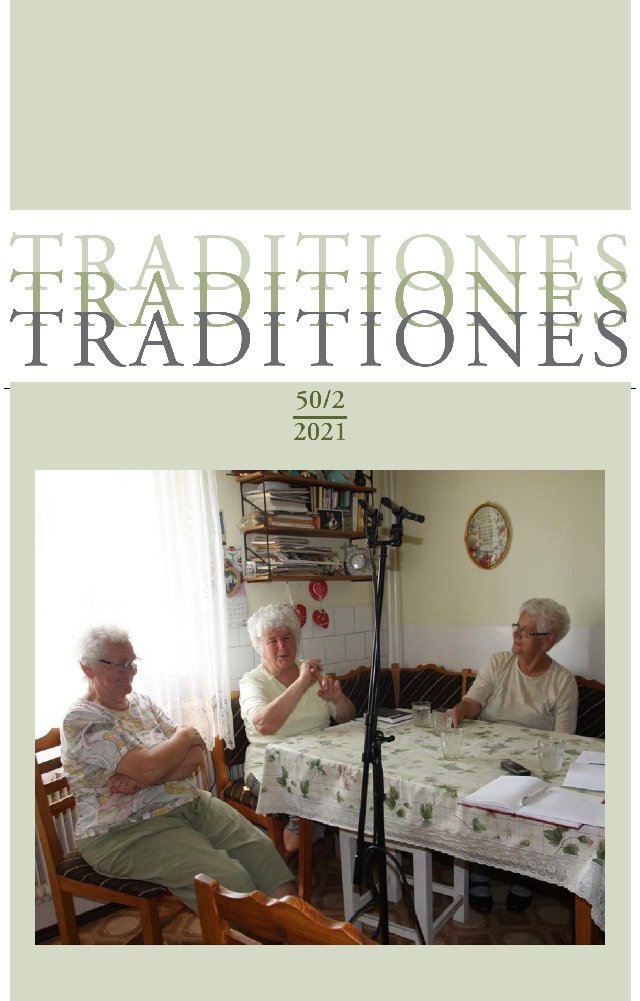»Pogumno je jahati naokrog in slediti taboru«: Jezikovno potovanje škotske ljudske pesmi z irskim vojakom skozi prostor in čas
DOI:
https://doi.org/10.3986/Traditio2021500203Ključne besede:
škotski jezik, ljudska pesem, pesmi na letakih, tradicija, preporodna ljudska glasba, AberdeenshirePovzetek
V članku je obravnavana ena pesem, »The Bonny Lass o Fyvie«, v primerih s Škotske, iz Anglije in Severne Amerike. Ko se premika med različnimi jezikovnimi kodi – iz škotskega jezika v angleško, ulstrsko-škotsko in ameriško angleščino – prihaja do velikih premikov v tem, kako občinstvo razume njena sobesedila. Vsebina pesmi je bila najprej uveljavljanje pravic žensk, da dosežejo neodvisnost od moških želja, in o ranljivosti zaljubljenih moških. Konča pa se kot tematizacija ranljivosti žensk, ko je pesem odmaknjena od izvirne kulture.
Prenosi
Literatura
Baez, Joan. 1963. Fennario. Joan Baez in Concert Part 2. New York: Vanguard. VSD 21–23. https://youtu.be/tWWOGBNRC5c.
Beiner, Guy. 2003. Oral Herstoriography. In Ireland (Ulster) Scotland: Concepts, Contexts, Comparisons, eds. Edna Longley, Eamonn Hughes and Des O’Rawe, 86–93. Belfast: QUB Press.
Bold, Valentina. 2009a. “I wish I was whaur Helen lies”: Collection, Community and Regeneration in Modern South West Scotland. Markings 28: 57–68.
Bold, Valentina. 2009b. Introduction. In Robert Burns’ Merry Muses of Caledonia, eds. Valentina Bold et al. Edinburgh: Luath.
Buchan, David. 1972. The Ballad and the Folk. London: Routledge, Kegan Paul.
Calin, William. 2000. Minority Literatures and Modernism: Scots, Breton and Occitan, 1920-1990. Toronto: University of Toronto Press.
Campbell, Olive Arnold, and Cecil James Sharp. 1917. English Folk Songs from the Southern Appalachians. New York: G. P. Putnam. Canmore. 2021. Fort George. www.canmore.org.uk/site/174512/fort-george.
Carby, Hazel V. 1995. National Nightmares: The Liberal Bourgeoisie and Racial Anxiety. In Racial and Ethnic Identity: Psychological Development and Creative Expression, eds. Herbert W. Harris, Howard C. Blue and Ezra E. H. Griffith, 173–192. London: Routledge.
Carroll, Jim. 2020. Personal communication.
Cheyne, Sandy. 2002. Lucky Escape for Fyvie’s Bonnie Lass. The Leopard, September. Child = Child Ballads: A Complete List. https://contemplator.com/child/cmpltchl.html.
Christiansen, Reidar Thoralf. 1958. The Migratory Legends. Helsinki: Suomalainen Tiedeakademia.
Clancy Brothers, The, and Tommy Makem. 1965. The Maid of Fife. Recorded Live in Ireland. New York: Columbia. PCT 9065. https://youtu.be/k8garPXFIgg.
Cowan, Edward J. 2000. Sex and Violence in the Scottish Ballads. In The Ballad in Scottish History, ed. Edward J. Cowan. Phantassie, East Linton: Tuckwell.
Dubliners, The. 1964. Maid of Fife e’o. Irish Folk Night. New York: Decca. LK 4633 LP. https://youtu.be/L28Cr85yRJc.
Duncan, Bell. N.d. The Bonnie Lass o Fyvie. James Madison Carpenter Collection. Washington: American Folklife Center 1972/001, Cylinder 114 01:13). http://www.dhi.ac.uk/carpenter.
Dylan, Bob, 1962. Pretty Peggy-O. Bob Dylan. New York: Columbia. CS 8579. www.bobdylan.com/songs/pretty-peggy-o.
European Charter, The. 2021. www.scotslanguage.com/articles/node/id/250f.
Fiske, Roger. 1983. Scotland in Music: A European Enthusiasm. Cambridge: Cambridge University Press.
Fyfe, Iona. 2021. Bonnie Lass of Fyvie. https://ionafyfe.bandcamp.com/track/bonnie-lass-of-fyvie.
Greig-Duncan. 1981–2002. In The Greig-Duncan Folksong Collection, eds. Patrick Shuldham-Shaw and Emily B. Lyle. Aberdeen: Aberdeen University Press. University Press.
HESI. 2021. Historic Environment Scotland Inventory. www.portal.historicenvironmentscot.designation/BTL22.
Kelly, Sam. 2017. Pretty Peggy. London: Navigator. B073VZRDD2.
Kemp, Willie. 1931. The Miles and the Road to Dundee / The Bonnie Lass o Fyvie. Ellon, Aberdeenshire: Beltona. BL 1695.
Lyle, Emily, ed. 1997. Scottish Ballads. Edinburgh: Canongate Press.
MacColl, Ewan, and Peggy Seeger. 1960. The Bonny Lass of Fyvie. Popular Scottish (Folkways Records, 1960) FW 8757. https://youtu.be/K837d7-0hRc.
Malinky. 2000. The Bonny Lass of Fyvie. Last Leaves (2000), Greentrax CDTRAX 190. https://youtu.be/PMZmI-Hn_DU.
Manning, Susan. 2002. Fragments of Union: Making Connections in Scottish and American Writing. New York: Palgrave.
McKean, Tom. 2019. Speaking from the Heart in Doric: The Language of Home and Family. The Press and Journal. 5. https://www.pressandjournal.co.uk/fp/lifestyle-columnists/1904993/tom-mckean-speaking-from-the-heart-in-doric-the-language-of-home-and-family.
Millar, Robert McColl. 2018. Modern Scots: An Analytical Survey. Edinburgh: Edinburgh University Press.
Old Blind Dogs. 1992. The Bonnie Lass O’ Fyvie. New Tricks (Lochshore), CDLOC 1068. https://youtu.be/3AlLt__iTk0.
Olson, Ian A. 2010. “The Bonny Lass o’ Fyvie” or “Pretty Peggy of Derby”? Review of Scottish Culture 22: 150–163.
Post, Jennifer C. 2004. Clyde Colvill: Reconstructing a Community Tradition. In Folk Song: Tradition, Revival, and Re-Creation, eds. Ian Russell and David Atkinson, 463–475. Aberdeen: The Elphinstone Institute.
Pretty Peggy of Derry. c. 1819–44. Harding B25 (1565). Harding B 25(1565). http://ballads.bodleian.ox.ac.uk/view/sheet/4531.
Robb, Elizabeth. N.d. The Bonnie Lass o Fyvie. James Madison Carpenter Collection. AFC 1972/001, Cylinder 167 08:13.
Robinson, Philip. 2018. Ulster-Scots: A Grammar of the Traditional Written & Spoken Language. Belfast: Ullans Press.
Roud = List of Folk Songs by Roud Number. https://en.wikipedia.org/wiki/List_of_folk_songs_by_Roud_number.
Royal Scots Dragoon Guards. 2008. The Lass o’ Fyvie. Auld Lang Syne (Scotdisc BGS Productions, 2008) CDITV783. https://youtu.be/nQ_q1Ih6W9M.
Scots History. 2021. www.scotslanguage.com/Scots_history.
Smith, Donald. 2001. Storytelling Scotland: A Nation in Narrative. Edinburgh: Polygon.
Strachan, John. 2002. Songs from Aberdeenshire. Rounder Records, 1161-1835-2. https://youtu.be/b6uitPvxpNM.
Prenosi
Objavljeno
Kako citirati
Številka
Rubrike
Licenca

To delo je licencirano pod Creative Commons Priznanje avtorstva-Nekomercialno-Brez predelav 4.0 mednarodno licenco.
Avtorji jamčijo, da je delo njihova avtorska stvaritev, da v njem niso kršene avtorske pravice tretjih oseb ali kake druge pravice. V primeru zahtevkov tretjih oseb se avtorji zavezujejo, da bodo varovali interese založnika ter da bodo povrnili morebitno škodo.
Podrobneje v rubriki: Prispevki






